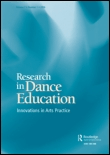
Body Movement and Dance in Psychotherapy
Scope & Guideline
Exploring the Healing Power of Movement
Introduction
Aims and Scopes
- Embodied Therapeutics:
The journal emphasizes the therapeutic potential of dance and movement, exploring how these modalities can facilitate emotional, psychological, and physical healing. - Interdisciplinary Approaches:
Research published in the journal often draws from various disciplines including psychology, sociology, and the arts, fostering a holistic understanding of movement-based therapies. - Cultural and Social Contexts:
The journal addresses the cultural implications of dance movement therapy, showcasing practices from diverse backgrounds and their relevance in contemporary therapeutic settings. - Research and Evidence-Based Practices:
A strong focus on empirical research, including quantitative studies and systematic reviews, is evident, highlighting the effectiveness of dance movement therapy across different populations. - Innovation in Therapeutic Techniques:
The journal promotes innovative practices and methodologies within dance movement therapy, encouraging practitioners to explore new ways of integrating movement into therapeutic settings.
Trending and Emerging
- Trauma-Informed Practices:
There is a growing emphasis on trauma-informed approaches within dance movement therapy, focusing on how movement can aid in processing and healing from trauma. - Culturally Informed Practices:
Research exploring the intersection of culture and dance therapy is on the rise, emphasizing the importance of culturally relevant practices in therapeutic settings. - Online and Remote Therapeutic Practices:
The adaptation of dance movement therapy to online platforms has gained traction, particularly in response to the COVID-19 pandemic, highlighting the need for innovative approaches to therapy. - Integration of Technology:
Emerging themes include the exploration of technology's role in therapy, such as the implications of the metaverse for dance movement therapy practices. - Focus on Social Justice and Activism:
Increasingly, the journal addresses themes of social justice and activism, exploring how dance movement therapy can contribute to broader societal change and personal empowerment.
Declining or Waning
- Traditional Dance Forms:
There has been a noticeable decrease in the exploration of traditional dance forms within therapeutic contexts, as the journal shifts towards more contemporary and integrative practices. - Single-Disciplinary Studies:
Research that focuses solely on dance or movement without integrating psychological theories and practices appears to be less frequent, indicating a trend towards interdisciplinary approaches. - Static Models of Therapy:
The journal has seen less emphasis on static models of dance movement therapy, with a preference for dynamic, evolving frameworks that adapt to the needs of clients. - Limited Focus on Children:
Research specifically targeting dance movement therapy for children has diminished, possibly reflecting a broader trend towards adult-focused therapeutic practices.
Similar Journals

Revista de Psicoterapia
Empowering Practitioners with Evidence-Based InsightsRevista de Psicoterapia is a prominent scholarly journal dedicated to the fields of psychotherapy and psychological practice, published by REVISTA PSIQUIATRIA & PSICOLOGIA HUMANISTA, S L. With its ISSN 1130-5142 and E-ISSN 2339-7950, the journal serves as a vital resource for researchers, practitioners, and students who seek to explore innovative therapeutic practices and advancements in the field of mental health. Although specific impact metrics like HIndex or Scopus rankings are currently unavailable, the journal is recognized for facilitating meaningful discourse on psychotherapy, showcasing empirical research, clinical studies, and theoretical advancements. It aims to promote evidence-based practices and interdisciplinary collaboration in the mental health community. As an essential platform in psychotherapy research, Revista de Psicoterapia fosters an understanding of psychological phenomena while addressing contemporary challenges in psychotherapy, making it indispensable for anyone committed to the advancement of psychological well-being.

Biomedical Human Kinetics
Empowering Health Through Evidence-Based ResearchBiomedical Human Kinetics, an esteemed academic journal published by SCIENDO, focuses on the intricate intersections of human movement, rehabilitation, and the study of physical therapies. Since its transition to an open access model in 2009, this journal has become a vital platform for sharing groundbreaking research and innovative methodologies in the fields of Orthopedics, Sports Medicine, and Physical Therapy. With an ISSN of 0043-9630 and an E-ISSN of 2080-2234, it operates out of Poland, providing global access to high-quality research. The journal’s standing in 2023 is notable, ranking in the Q3 category for both Orthopedics and Sports Medicine and Physical Therapy, Sports Therapy, and Rehabilitation, reflecting its commitment to fostering academic discourse within these important and evolving domains. Furthermore, with Scopus rankings placing it in the 36th percentile in its categories, Biomedical Human Kinetics is recognized for its contributions to the academic community. As it converges research efforts from 2016 to 2024, this journal serves as a cornerstone for researchers, professionals, and students dedicated to enhancing human health and performance through informed scientific exploration.

International Journal of Sports Physical Therapy
Empowering rehabilitation with innovative insights.Welcome to the International Journal of Sports Physical Therapy, a premier platform dedicated to advancing the field of sports therapy and rehabilitation. Published by the NORTH AMER SPORTS MEDICINE INST-NASMI, this open access journal has been vital in disseminating state-of-the-art research since its inception in 2011. With an ISSN of 2159-2896, it boasts a commendable standing within the academic community, achieving a Q2 ranking in 2023 across multiple categories, including Orthopedics and Sports Medicine, Physical Therapy, and Rehabilitation. Spanning diverse topics relevant to sports physical therapy, this journal serves as an invaluable resource for researchers, clinicians, and students alike, promoting best practices and innovative techniques in the field. By maintaining a commitment to high-quality peer-reviewed content, it not only contributes significantly to the existing body of knowledge but also fosters collaboration among professionals seeking to enhance patient care and rehabilitation outcomes.

Psychotherapie
Fostering Collaboration Between Theory and PracticePsychotherapie is a pivotal academic journal dedicated to the exploration and advancement of clinical psychology, published by the esteemed Springer. Since its inception in 2022, this journal has established a significant footprint in the field, currently positioned in the Q3 category for Clinical Psychology in 2023, as well as being recognized for its Scopus ranking within the top half of its category. This valuable resource features a broad scope of peer-reviewed articles aimed at both theoretical and practical developments in psychotherapy, making it a vital platform for researchers, professionals, and students alike. While the journal is not open access, it maintains a commitment to disseminating high-quality research that can influence best practices and contribute to the ongoing discourse in psychology. The journal's editorial objective is to connect scientific research with clinical practice, ensuring insights garnered from emerging studies are readily available to enhance therapeutic outcomes. Located in the USA with a strong presence in Germany, Psychotherapie promises to be an essential resource for anyone keen on innovative therapeutical approaches and psychological research.

International Journal of Integrative Psychotherapy
Advancing the Future of Psychotherapy.International Journal of Integrative Psychotherapy is a leading platform dedicated to advancing the field of psychotherapy through rigorous research and innovative practices. Published by the International Integrative Psychotherapy Association in Ljubljana, Slovenia, this journal has been an Open Access publication since 2010, ensuring that cutting-edge research is accessible to a global audience. The journal addresses a wide array of topics within integrative psychotherapy, fostering interdisciplinary dialogue and collaboration among researchers, practitioners, and students. With a commitment to promoting well-rounded and evidence-based psychotherapeutic approaches, the International Journal of Integrative Psychotherapy plays a pivotal role in shaping the future of mental health care. Whether you are a seasoned researcher or a budding professional, this journal offers valuable insights that enhance understanding and application in the realm of psychotherapy.

Choreographic Practices
Cultivating New Voices in ChoreographyChoreographic Practices is a pioneering journal dedicated to the exploration and analysis of choreography within the field of performing arts, established in 2014 and published by the renowned INTELLECT LTD. As a forum for innovative scholarship, this journal provides a platform for researchers and practitioners to engage in critical discussions regarding the theory and practice of choreography, addressing diverse methodologies and perspectives that shape contemporary dance. Despite its Q4 ranking in the visual and performing arts category, Choreographic Practices aims to enhance the visibility and understanding of choreographic work, allowing contributors to disseminate their findings and artistic practices widely within the academic and artistic communities. Operating from the United Kingdom, the journal serves as an essential resource for scholars, professionals, and students seeking to deepen their knowledge and enhance their practice in the field of choreography.

Journal of Cognitive Psychotherapy
Exploring the Intersection of Thought and HealingJournal of Cognitive Psychotherapy, published by SPRINGER PUBLISHING CO, is a premier academic platform that has been advancing the field of cognitive psychology and psychotherapy since its inception in 1987. With an ISSN of 0889-8391 and an E-ISSN of 1938-887X, this journal is committed to disseminating high-quality research and innovative practices within its scope, which encompasses clinical psychology, experimental and cognitive psychology, as well as psychiatry and mental health. Ranked in the third quartile (Q3) in the 2023 category quartiles for these fields, it serves as a vital resource for researchers, healthcare professionals, and students alike, providing insights that contribute to theory, practice, and future research directions. Although currently not an Open Access journal, Journal of Cognitive Psychotherapy remains dedicated to fostering collaboration and growth within the psychological community, offering essential findings that support clinical practices and enhance therapeutic outcomes.

MOVEMENT DISORDERS
Advancing the Frontiers of Neurological ResearchMOVEMENT DISORDERS, published by Wiley, stands as a premier outlet for cutting-edge research in the field of neurology, particularly focusing on the various aspects of movement disorders. With both its ISSN (0885-3185) and E-ISSN (1531-8257) identifiers, this journal is at the forefront of neurological research, holding a remarkable impact factor and recognized in the top quartiles (Q1) of the disciplines of Neurology and Clinical Neurology as of 2023. The journal boasts an impressive Scopus ranking, placing it in the top 8 out of 192 for Neuroscience-Neprology and 19 out of 400 for Medicine-Clinical Neurology, reflecting its high relevance and influence in the field. Released quarterly since its inception in 1986 and continuing through 2024, MOVEMENT DISORDERS publishes a mix of original research articles, reviews, and case reports that catalyze innovation and foster collaboration among researchers, healthcare professionals, and students dedicated to understanding and treating movement disorders. As a non-open access journal, it nevertheless offers valuable insights that are essential for the advancement of knowledge in neurology, making it a critical resource for anyone invested in this challenging and evolving field.

AMERICAN JOURNAL OF PSYCHOTHERAPY
Innovating Clinical Practice for Enhanced Mental Health.AMERICAN JOURNAL OF PSYCHOTHERAPY, published by American Psychiatric Publishing, Inc, stands as a pivotal resource in the field of clinical psychology and psychotherapy, with an ISSN of 0002-9564 and an E-ISSN of 2575-6559. Since its inception in 1947, this esteemed journal has provided a rigorous platform for the dissemination of cutting-edge research, innovative clinical practices, and theoretical advancements in psychotherapy. With a respectable impact factor that places it in the Q2 quartile for both Clinical Psychology and Miscellaneous Medicine, it ranks in the 54th percentile among clinical psychology journals according to Scopus. The journal seeks to foster scholarly dialogue and inform evidence-based practices among researchers, practitioners, and students alike, encouraging the exploration of diverse therapeutic modalities and the integration of new research findings that enhance clinical outcomes. This commitment to academic excellence ensures that the AMERICAN JOURNAL OF PSYCHOTHERAPY remains an essential tool for those dedicated to the advancement of mental health care.

Research in Dance Education
Transforming Dance Practices Through ResearchResearch in Dance Education, a prestigious journal published by Routledge Journals, Taylor & Francis Ltd, is an essential resource for those engaged in the dynamic fields of dance and education. With an ISSN of 1464-7893 and an E-ISSN of 1470-1111, this journal stands out for its commitment to advancing scholarly discourse in dance and its pedagogical approaches. Since its inception, it has been an invaluable platform for researchers, educators, and practitioners interested in the intersection of dance and education, disseminating innovative research and theoretical reflections that span diverse cultural and educational contexts. With an impressive Q1 ranking in Visual Arts and Performing Arts for 2023 and a solid Q3 ranking in Education, it clearly demonstrates its impact within these academic domains. Spanning from 2010 to 2024, the journal reflects its ongoing dedication to fostering scholarship that critically examines contemporary practices and education strategies in dance. Researchers and students alike will benefit from its range of articles, providing insights not only into instructional methodologies but also into the cultural significance of dance as a form of expression and learning.